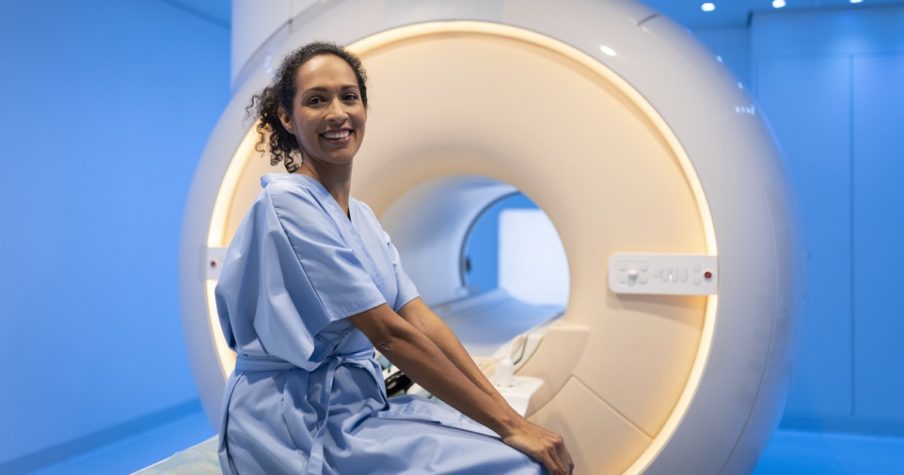MRI Scan
An MRI scan is a noninvasive, safe way for healthcare professionals to examine a patient's organs, tissues, and skeletal system. MRI, or Magnetic Resonance Imaging, is diagnostic technology that uses a powerful magnetic field and computer-generated radio waves to create detailed, 3D images of the organs and tissues of the body that can be viewed from many different angles. The magnetic field temporarily realigns water molecules in the body. Radio waves cause these realigned atoms to produce signals, which are used to create the cross-sectional MRI images. MRI is often the standard of care for examining areas of the body including:
Types of MRI Scanners
One type of MRI scanner is a large tube called a “bore.” This opening is commonly two feet in diameter. When a patient is placed inside the bore, they are inserted with the MRI’s sliding table. A common question asked is if someone will go inside the MRI head or feet first. The answer will depend upon the type of MRI being performed. The area of the patient’s body that is being scanned needs to be at Iso-center, a scientific term that can be summarized in layman’s terms meaning to be in the center of the magnet. If a patient is having an MRI of the brain, the patient will go in head first. If it is an MRI of the ankle, they will go in feet first.
Because of the duration of a typical study (often up to 90 minutes), and the closed environment, some patients who are inserted head first may experience a bout of claustrophobia. For larger bariatric patients, their physical size may not fit comfortably within the bore.
Fortunately, Capitol Imaging Services offers MRI scanners that do not have a bore. Instead, these magnets are designed as an “open” MRI and are available to accommodate these patients. Once a patient is placed correctly inside the open MRI, they have a wide ranging view of the exam room, creating a more comfortable, relaxed imaging environment.
Are MRI Scans Safe?
An estimated 150 million patients have had MRI examinations. Every year, approximately 10 million patients undergo MRI procedures. MRI has been shown to be extremely safe as long as proper safety precautions are taken. In general, the MRI procedure produces no pain and causes no known short-term or long-term tissue damage of any kind.
The powerful magnetic field of the scanner can attract certain metallic objects known as “ferromagnetic” objects, causing them to move suddenly and with great force towards the center of the MR system. This may pose a risk to the patient or anyone in the way of the object. Therefore, great care is taken to prevent ferromagnetic objects from entering the MR system room. It is vital that you remove metallic objects in advance of an MRI exam, including watches, jewelry, and items of clothing that have metallic threads or fasteners.
Not everyone can undergo an MRI
MRI facilities have screening procedures that, when carefully followed, will ensure that the MRI technologist and radiologist knows about the presence of metallic implants and materials so that special precautions can be taken (see below). In some unusual cases the examination may be canceled because of concern related to a particular implant or device.
In some unusual cases the examination may be canceled because of concern related to a particular implant or device. An MRI may be determined to be inappropriate if the patient has a ferromagnetic aneurysm clip because of the risk of dislodging the clip from the blood vessel. Also, the magnetic field of the scanner can damage an external hearing aid or cause a heart pacemaker to malfunction. If you have a bullet or other metallic fragment in your body there is a potential risk that it could change position, possibly causing injury.
Our centers will pre-screen each patient in order to qualify them as being eligible to safely undergo an MRI. If it is determined that an MRI is not safe for a patient, we often recommend that a Computed Tomography (CT) scan as the best diagnostic alternative.
MRI preparations and what to expect
In the majority of common MRI scans, there is no special preparation required. What is required is the removal of all metals and metallic objects such as jewelry, pins or ornaments that may be in the hair. A patient cannot wear any clothes containing metal, such as zippers or buttons. No eye makeup should be worn. Medication patches and metal dentures should also be removed.
MRI should also be used with caution in early pregnancy. MRI is generally not used in the first 12 weeks of pregnancy unless there is a strong medical need to do so. There are other methods of imaging that can be used if a woman is pregnant.
The MRI machine makes a variety of loud clicking, knocking and banging noises. In a closed MRI machine, you may have difficulty hearing. Special earphones or earplugs are provided to minimize noise levels and allow a patient to hear any instructions or questions that are being asked by the MRI technologist.
After the exam is completed, most often, you can return to your normal activities. However, if a patient is given sedation as part of the scan, they will not be allowed to drive themselves. Alternate transportation will be required.
Images acquired by the MRI will be reviewed by a Capitol Imaging Services radiologist. In some cases, a radiology subspecialist may be assigned to the scan as they have advanced training in certain medical areas such as neurology, joints, extremities and women’s health. Once reviewed, the radiologist will produce a detailed report and send the findings to the prescribing medical or healthcare provider.
Have Questions? We have answers!
Capitol Imaging Services facilities are accredited to perform an MRI scan. This means we meet or exceed the standards set by the American College of Radiology and the Intersocietal Accreditation Commission for quality, patient safety, reporting and technological expertise. Your safety is our priority.
Ready to schedule your MRI scan? Contact us today to schedule your appointment! A Capitol Imaging Services associate will be happy to answer your questions and arrange a visit.


